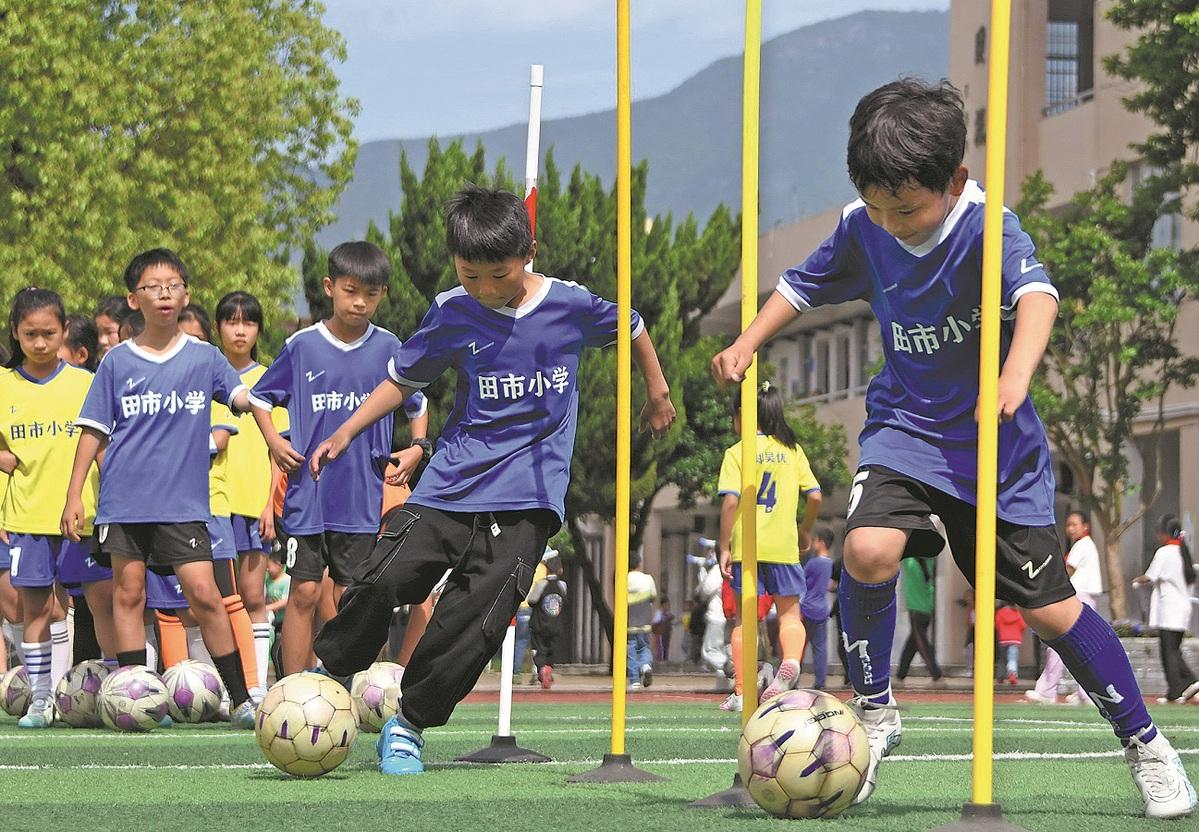
 0 Comment(s)
0 Comment(s) Print
Print E-mail China Daily, May 24, 2024
E-mail China Daily, May 24, 2024
School soccer programs should be reformed in pilot zones to foster more talent and promote the development of group sports, experts said.
Eight regions in China have been designated as the first batch of comprehensive reform pilot zones for promoting soccer among youth on campuses, according to the Ministry of Education.
The pilot zones are in Dalian in Liaoning province; Zhengzhou in Henan province; Jinan in Shandong province; Chengdu in Sichuan province; Bijie in Guizhou province; Wuwei in Gansu province; Ganzhou in Jiangxi province; and Yanbian Korean autonomous prefecture in Jilin province.

Students from a school soccer team train on the playground at a primary school in Xianju, Zhejiang province, on May 14. WANG HUABIN/FOR CHINA DAILY
A launch ceremony for the pilot zones was held during a recent meeting in Dalian to discuss the establishment of soccer colleges and majors at higher education institutes, the ministry said.
Xiong Bingqi, director of the 21st Century Education Research Institute, said regional authorities applied to become pilot zones in response to the national call to cultivate soccer talent and promote the integration of sports and education.
"It does not mean that these regions have already established high-level demonstration zones. They need to explore real reforms with policy and financial support," Xiong said.
Sun Ke, co-founder of youth soccer club Hi Kicker in Beijing, said many of the eight regions have a tradition of soccer training or have strong professional teams.
"Henan is famous for its campus football, and the sport is especially popular in Zhengzhou," Sun said. "Leading schools in the city all include football in their curriculums and had outstanding performances in the China High School Football League," Sun said.
The professional soccer teams in Dalian, Jinan and Chengdu performed well in the China Super League, while the Village Super League in Guizhou featuring rural soccer-lovers attracted millions of fans.
"Local children and students are also immersed in the atmosphere of soccer matches," Sun said.
Hi Kicker has 12,000 trainees from 4 to 12 years old and 400 coaches in 12 cities nationwide, aiming to foster children's interest in the sport outside schools.
"As soccer is getting more popular, training resources such as teachers and fields on campuses are becoming more limited and cannot meet all players' needs, so only the most talented are selected to the school team," Sun said.
Zhang Meng had his 5-year-old son join Hi Kicker to explore his interest in sports and help him make more friends. "The club has its own playground, and the professional coaches interact well with children. My kid plays four times a week and has kept at it for half a year," Zhang said.
His son has become more confident and has also made several friends playing soccer at his kindergarten, he added.
The education ministry said the pilot zones will carry out measures such as increasing soccer class hours in schools as well as the number of coaches and fields, aiming to improve the competitive level of youth soccer.
Xiong said the previous promotion of youth soccer development resulted in a utilitarianism problem, as many students used the sport as a means to advance their academic careers, rather than genuinely trying to improve their soccer skills. "This is reflected in the unsatisfactory performance of the national football team in recent years," he said.
The pilot zones should aim to fundamentally address the issue of building a healthy educational system and promote the integration of sports and education, he added.
Go to Forum >>0 Comment(s)